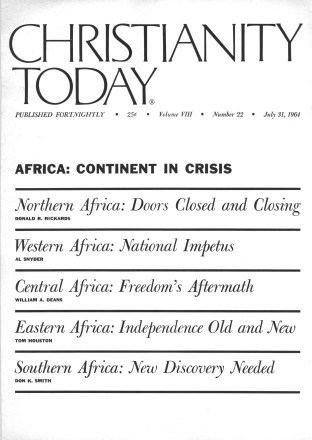Usually, we think of the Great Commission in geographical terms. Result: we think of a missionary as somebody who has been transplanted from one environment to another.
The Great Commission does have geographical implications. Because the Church has so understood it down through the years, Christ’s servants have risen up, left home and country behind, and gone to strange, far-off places for his sake and the Gospel’s.
But is this the only sense in which our Lord commissions us? A great host of witnesses rise up to cry “No!” These are men and women who have never been called to a strange land, have never been led out of their own profession and trade. Yet they are missionaries, conscientiously fulfilling the purpose and program of Christ. Christ has summoned them to go—not to a geographical location but to their fellow workers and friends, there to bear witness to the glory of his Gospel.
These are laymen, God’s redeemed children, called to salvation and called to service. Theirs is not what we usually call “full-time service”; but “full-time” it is, and “service” it is, because Christ has called them—and they have gone—to the factory, to the schoolroom, to the hospital, with the Gospel of Christ. And just as at the heart of Evangelism-in-Depth is the insistence that only through lay witness like this can the world ever be adequately evangelized, so here in the homeland, Christ will be fully present only when we learn that “Go ye” means something more than geography.
Here is a surgeon, known for his professional skill. The operating-room nurses have noted something different about him. They have become accustomed to the sudden hush that comes over the operating room just before the doctor begins the operation. His head is bowed; he is at prayer. There is no ostentation, but there is a clear confession of dependence on his Saviour. To nurses, patients, fellow doctors he is a man who loves Christ and is unashamed of his Lord. He has heard Christ’s “Go ye,” and he has gone—to the operating room. And the Gospel is known when it might not have been heard otherwise, because of his obedience.
An office worker quietly fives a holy life before his colleagues. He speaks a word for Christ whenever the Spirit gives him an opportunity, but he knows that this witness is valuable only as his life confirms it. He asks the Lord to use his witness for the glory of God. He is not very surprised, therefore, when one day a fellow worker says to him, “There’s something different about you! I’ve watched you for a long time, and I want what you’ve got!” And so the Gospel is heard in an area that might never have been reached had not one man known that “Go ye into all the world” means the office and the factory as well as the Congo or Argentina.
A group of retarded children are patiently, tenderly taught by an earnest young Christian. In their own way they know that he cares for them and loves them, and they respond to this love. He is motivated by something more than compassion; he is there because as a layman he has heard Christ say “Go ye,” and he has gone.
The room at the end of the hall in the university dormitory is a popular place. A graduate student lives there and serves as counselor for that floor. The other students find it a good place to visit; they get a hearing for their problems, sympathetic understanding, and often a word that points them to the only real Source of help. The graduate student is there, not just to earn some extra money toward his tuition, but because Christ’s “Go ye” meant for him a dormitory mission field.
These are not hypothetical cases. They are real people—laymen I have known. They are men (and there are women no less fruitful in similar service) who have heard the Great Commission and have responded. These are missionaries, whether or not the local church or anyone else recognizes them as such. They are part of a wonderful thing God is doing throughout the world today. He is saying “Go ye!”; and men and women who have never been to seminary, who will never know the ordination of men, are responding to the commission of God and going with the Gospel—to hospital, to homes, to factory, to college.
Are you one of them?
Horace L. Fenton, Jr., is associate general director of the Latin America Mission. He holds the degrees of A.B. and D.D. from Wheaton College and B.D. from Princeton Theological Seminary and has been associated with the Latin America Mission since 1948. Dr. Fenton prepared this article for the “Latin America Evangelist.”










